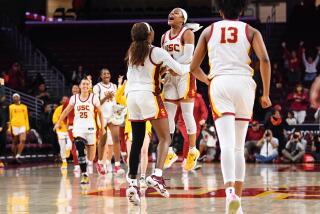Music Review : Royal Northern College Shows a Wide Range at USC
- Share via
Why do things the usual way?
That is the question the composers, performers and producers involved in the Royal Northern College of Music’s music theater/instrumental program Thursday night must have asked themselves. It certainly wasn’t business as usual.
A wide-ranging 20th-Century agenda featured unusual combinations and imaginative presentations as key elements in the Manchester musicians’ second offering in Bing Theatre at USC, part of the UK/LA Festival.
That the music itself and the performances didn’t consistently live up to the high concept seemed of secondary importance--though hardly negligible.
Most satisfying from all aspects was Judith Weir’s opera in three acts and 12 minutes, “King Harald’s Saga,” for unaccompanied soprano. Based on an Icelandic saga that tells the story of the Norwegian’s invasion of Britain and subsequent defeat and death at Stamford Bridge just 19 days before the Battle of Hastings, Weir’s opera effectively conjures a feeling of time and place, the singer taking all roles and mellifluous music slipping quickly high and low: The soprano is both bard and siren.
Camilla Johansen gave an engrossingly dramatic, liquid-voiced performance, roving over the stark setting of platforms and the ribs of a ship.
Stephen Oliver’s “The Waiter’s Revenge,” cleverly conveys the vicissitudes of a restaurateur with wordless music--rhythmic anxieties, whining complaints, lyrical flights--for six unaccompanied vocalists, and the RNCM performers strutted vitally through it.
Samuel Barber’s short opera, “A Hand of Bridge,” for voices and chamber orchestra, proved an amusing melange of the thoughts of its four card players, who, of course, aren’t thinking about the game.
Simon Holt’s purely instrumental “Kites,” for quintets of woodwinds and strings, seemed a run-of-the-mill catalogue of contemporary twitterings, squiggles, shrieks and snaps, but the dispersal of the performers across the stage on different levels, and the projection, in changing colors, of developing cloud formations on a rear scrim, gave the work a spacious, lacy, almost hypnotic quality.
Arthur Bliss’ lively, neoclassical “Conversations” (1920), for mixed instrumental quintet, suffered from a merely orderly run-through and the lack of its descriptive movement titles in the program.
The concert, repeating tonight, opened with a crouching, quite naked Mary Hitch attempting, as Lady Macbeth, to wash off the blood, in Alison’s Bauld’s “Banquo’s Buried,” for soprano and piano. But even that startling opening and Shakespeare’s words couldn’t focus the composer’s improvisatory noodlings.
More to Read
The biggest entertainment stories
Get our big stories about Hollywood, film, television, music, arts, culture and more right in your inbox as soon as they publish.
You may occasionally receive promotional content from the Los Angeles Times.








